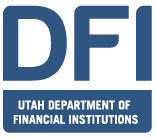What is a Utah Industrial Bank?
A Utah-chartered industrial bank (IB) is an institution subject to the same regulatory oversight as a Utah-chartered commercial bank. As of February 26, 1997, it may, but need not use the term “bank” or “savings bank” in its name. As of March 12, 1997, Utah law was amended to authorize the Department of Financial Institutions to charter new IBs. As of March 17, 2004, Utah law* was amended to rename the industry from Industrial Loan Corporations (ILCs) to Industrial Banks.
Generally, IBs are authorized to make all kinds of consumer and commercial loans and to accept federally insured deposits, but not demand deposits if they have total assets greater than $100 million. IBs are subject to the same regulatory and supervisory oversight as commercial banks. In many respects, however, IB activities and powers are not as restricted as commercial banks.
In Utah, the Department of Financial Institutions regulates all state-chartered financial institutions pursuant to authority of Title 7 of the Utah Code Annotated 1953, as Amended, “FINANCIAL INSTITUTIONS ACT.” IBs are authorized to engage in the “banking business” under the statutory framework of Title 7, FDIC rules and regulations that generally apply to commercial banks will apply.
The flexibility of an IB charter has made it an attractive vehicle for some large and well-known corporations. IBs offer a versatile depository charter for companies that are not permitted to, or that choose not to, become subject to the limitations of the Bank Holding Company Act or the Glass Steagall Act.
Most operating IBs have taken advantage of Utah’s Consumer Code and marketed specialized products or services nationwide. These companies have taken advantage of the exportation of interest rates and other charges afforded national banks and federally insured state-chartered financial institutions. An IB mainstay has been the issuance of credit cards to consumers and businesses nationally.
Utah has established a reputation for a positive regulatory environment. The process of obtaining an IB charter commences with an application to the Department of Financial Institutions under Sections 7-1-704 and 706 of the Utah Code and an application for insurance of deposits with the FDIC. Because the information requested in the FDIC application is similar to that requested in the State application, the FDIC application can be filed in lieu of the State application.
In reviewing an application and business plan for approval, the Department gives considerable weight to the following factors. Many other factors may also be considered in the ultimate approval process.
1. The character, reputation and financial standing of the organizer(s).
2. The organizers have the resources (source of capital) to support an IB.
3. Selection of a Board of Directors, the majority of who, must be outside, unaffiliated individuals, some of whom must be Utah residents.
4. The establishment of a Utah organization where autonomous decision making authority and responsibilities reside with the board and management such that they are in control of the IB’s activities and direction.
5. Utah-based management that has a track record, the knowledge, expertise and experience in operating a depository institution in a regulated environment.
6. Management that is independent of the parent; however, the goals and policies of the parent may be carried out if defined in the IB’s business plan.
7. A bona fide business plan and purpose for the existence of an IB, in which deposit taking is an integral component, including three years pro forma projections and supporting detail.
8. FDIC deposit insurance.
9. All IB lending and activities will be reviewed in light of strict compliance with the spirit and letter of Federal Reserve Regulations Section 23 A and B, Restrictions on Transactions with Affiliates and Regulation O.
As with all depository institutions, IBs are subject to safety and soundness examinations by the Department of Financial Institutions and the FDIC. IB examinations are usually conducted jointly with the FDIC annually. An IB is also subject to examinations under the Community Reinvestment Act and will receive a compliance examination.
If you have questions about IBs, please contact Shaun Berrett at the Utah Department of Financial Institutions, (801) 538-8841.
* Senate Bill 176 authorizes all industrial banks and those commercial and savings banks that are Sub S corporations to convert to Limited Liability Companies (LLCs). However, a change of tax status may only occur once the IRS approves banks for LLC status, which is expected. The drafting required changing Industrial Loan Corporation (ILC) to Industrial Loan company everywhere it occurs in the Code. DFI took advantage of this fact to make a change to Industrial Bank instead of ILC.
